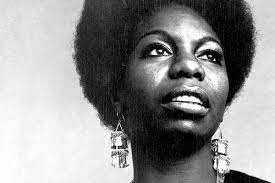Nina Simone, born Eunice Kathleen Waymon on February 21, 1933, in Tryon, North Carolina, was a pioneering figure in American music. Her unparalleled voice, incomparable talent on the piano, and fearless commitment to social justice made her one of the most influential artists of the 20th century.
Simone’s journey into the world of music began at an early age. Growing up in a modest household, she displayed exceptional musical aptitude and received her first piano lessons from her mother, a Methodist minister. Despite facing racial segregation and economic hardships in the Jim Crow South, Simone’s passion for music flourished. She honed her skills by playing in her local church and later studied classical piano at the Juilliard School in New York City.
It was in the smoky clubs of Harlem where Simone’s career truly took flight. Adopting the stage name “Nina Simone” to protect her family’s reputation, she captivated audiences with her distinctive voice, blending elements of jazz, blues, gospel, and classical music. Her rendition of “I Loves You, Porgy” from George Gershwin’s opera “Porgy and Bess” became a breakout hit in 1958, propelling her to stardom.
Throughout the 1960s, Nina Simone’s music became synonymous with the Civil Rights Movement. Inspired by the activism of figures like Martin Luther King Jr. and Malcolm X, she used her platform to address issues of racial injustice and inequality. Songs like “Mississippi Goddam,” “To Be Young, Gifted and Black,” and “Strange Fruit” became anthems of the era, reflecting the pain and resilience of the African American experience.
Beyond her activism, Simone’s music defied categorization. Her repertoire spanned genres, from soulful ballads to fiery protest songs, showcasing her versatility as an artist. Her ability to infuse raw emotion into every performance left audiences spellbound, earning her the title of “The High Priestess of Soul.”
However, Simone’s career was not without its challenges. Struggling with mental health issues and facing discrimination in the music industry, she experienced periods of turmoil and self-doubt. Yet, her resilience and unwavering commitment to her craft never wavered. Her iconic rendition of “Feeling Good” remains a testament to her indomitable spirit and enduring legacy.
In her later years, Nina Simone continued to inspire audiences around the world with her music and activism. Despite battling illness, she remained dedicated to advocating for social change until her passing on April 21, 2003. Her impact on music and society endures, with her songs continuing to resonate with audiences and artists alike.
Nina Simone’s legacy transcends the boundaries of genre and time. As a trailblazer, she paved the way for generations of artists to come, leaving an indelible mark on the world of music and beyond. Her fearless pursuit of truth and justice serves as a reminder of the power of art to transform hearts and minds, making her a true icon of the 20th century and beyond.


Comments are closed